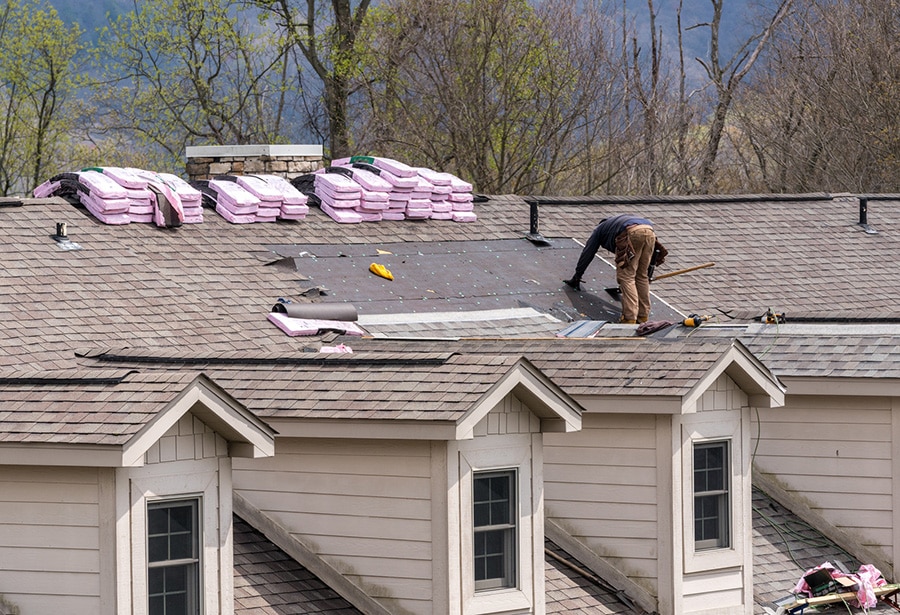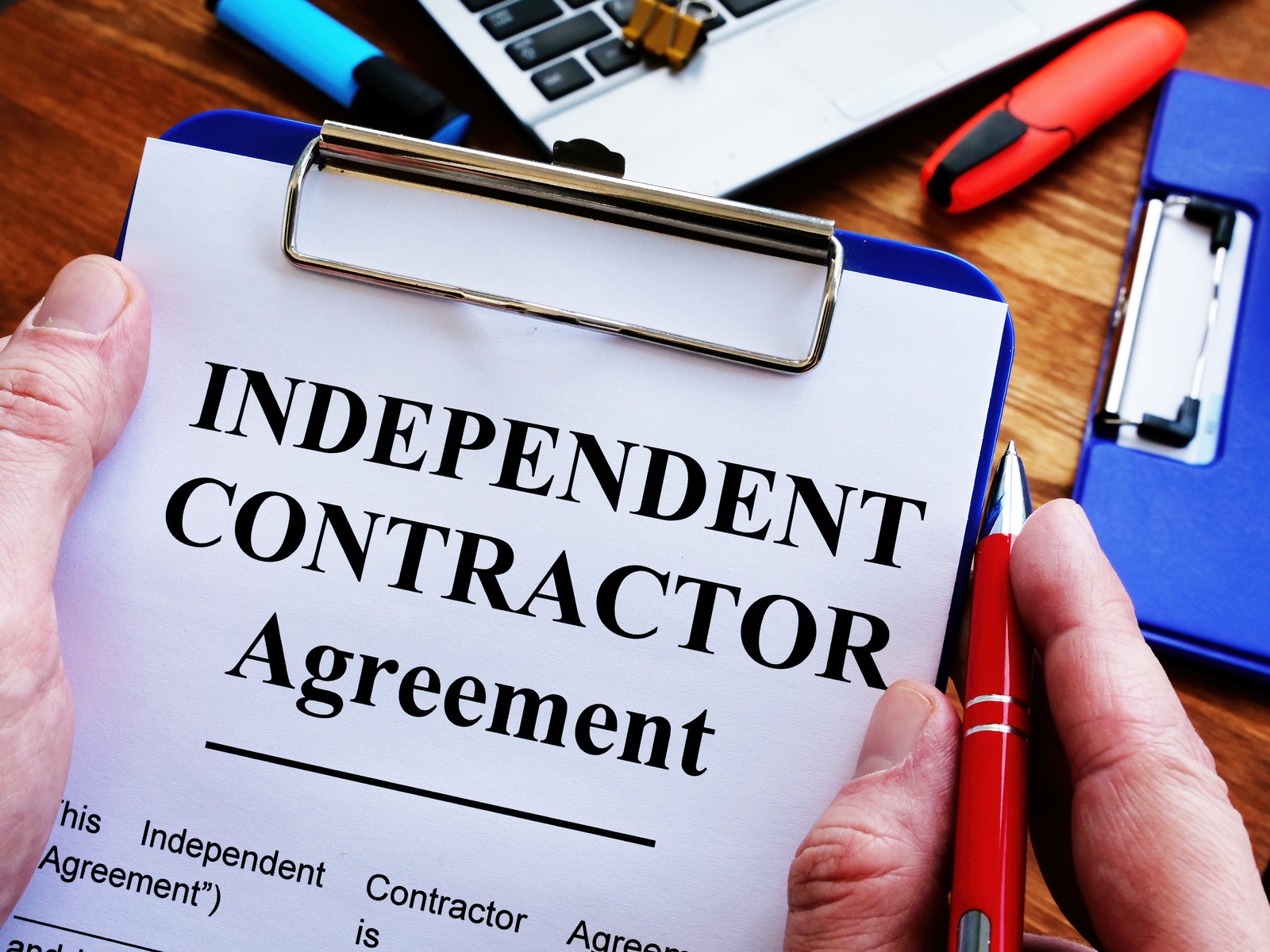Learn about your right to workers’ comp benefits after a roofing injury
According to the U.S. Bureau of Labor Statistics (BLS), there are approximately 131,980 roofers nationwide, including 2,660 people in the state of North Carolina. Most are employed as contractors or construction workers.
The roofing industry can be a lucrative one, but it can also expose its workers to a variety of occupational hazards. Common hazards include falls, exposure to bad weather, injuries from tools, and long-term damage from physical labor.
If you’ve been hurt on the job as a roofer, you might be eligible for workers’ compensation benefits, but this largely depends on how your job is classified. This article will help you understand if you qualify for benefits in North Carolina after a roofing injury and how to apply.
Notable statistics on roofer injuries
Roofers have the greatest fall risk of any type of construction worker. In fact, according to the BLS, falls involving nonfatal injuries to roofers occurred at a rate of 86.9 cases per 10,000 full-time workers in 2016.
The workers with the second highest number of fall-related injuries were painters, with a rate of 75.0 cases per 10,000 full-time workers that year. These rates far exceeded the rate for total worker nonfatal fall injuries combined, which was only 5.1 cases per 10,000 full-time workers.
Additionally, the Centers for Disease Control and Prevention (CDC) reported that roofers also had the highest rate of fatal falls from 2011 to 2017, representing 43% of all fatal falls in the construction sector.
Statistics on work injuries in North Carolina
While the statistics on roofing deaths are grim, the statistics on overall workplace injuries in North Carolina are more promising. In 2021, the BLS reported that there were 67,700 cases of nonfatal work injuries and illnesses within the state.
This represents a rate of 2.2 cases per 100 workers, which is lower than the national rate of 2.7 cases per 100 workers.
Most common roofer injuries
Roofing is one of the most hazardous professions, with roofers facing numerous risks daily. Here’s a list of the most common roofer injuries and how they typically occur:
- Fall-related injuries. Perhaps the most obvious risk for roofers is falling, which can lead to fractures, traumatic brain injuries, spinal cord injuries and even fatalities. These falls can occur due to a variety of reasons, including loss of balance, slippery surfaces (especially after rain or due to moss/algae), weak roof materials giving way, or tripping over equipment.
- Burns. Roofers often use hot tar and torch-down applications. Accidental spills, splatters or mishandling can lead to severe burns.
- Musculoskeletal injuries. Roofing involves heavy lifting, bending, kneeling and repetitive motions. Over time, these actions can lead to strains, sprains, repetitive stress injuries, and other musculoskeletal disorders. Constantly working on sloped surfaces puts stress on the back and knees in particular.
- Eye injuries. Small particles, splinters or chemicals can get into a roofer’s eyes, causing injuries. This happens especially when they’re cutting materials or when the wind blows debris around.
- Cuts and abrasions. Roofers use sharp tools like knives and nail guns. Improper use, mishandling or accidents can cause cuts or puncture wounds.
- Heat-related illnesses. Roofers often work in direct sunlight and high temperatures. This environment can lead to heat exhaustion, heat cramps, or in extreme cases, heat stroke.
- Electrocution. Coming into contact with overhead power lines or using electrical equipment on wet surfaces can pose electrocution risks that result in internal organ damage, cardiac arrest and death.
- Toxic exposure. Roofing materials, especially in older buildings, might contain harmful substances like asbestos or lead. When disturbed, these materials can release toxins that, when inhaled, can lead to serious respiratory issues and long-term health conditions like asbestosis and mesothelioma. Additionally, solvents used in various adhesives, sealants and cleaners can emit volatile organic compounds (VOCs). Inhalation of these compounds can lead to headaches, dizziness, and, in more severe cases, damage to the liver, kidneys, and central nervous system.
It’s essential for roofers to be trained in safety procedures, have access to and use appropriate safety gear, and ensure they’re always aware of their surroundings to minimize these risks.
North Carolina’s high school fall case
A 45-year-old Winston-Salem contractor fell from the roof of a North Carolina high school in early 2023. The case made headlines across the state when his body was found early in the morning near the school’s auditorium. He was rushed to a hospital, where he was pronounced dead. This is a tragic example of yet another preventable roofing fatality.
Eligibility requirements for workers’ compensation in North Carolina
Have you been hurt as a roofer in North Carolina? You might be entitled to workers’ compensation. There are 3 factors to consider in terms of eligibility:
- Your employer. Most businesses in North Carolina with 3 or more employees are required to have workers’ compensation insurance. However, there are exceptions for businesses in certain industries, including agriculture, logging and sawmill operations, and domestic housekeeping work.
- Your injury. Your injury must be work-related to qualify for workers’ comp. It can be either a one-time traumatic injury or an ongoing occupational disease or illness.
- Your employment status. Some roofers work as “independent contractors” rather than “employees” of a business. If you’re an independent contractor, you are NOT eligible for workers’ compensation.
North Carolina workers’ compensation laws for subcontractors & independent contractors
Learn about your legal options in Charlotte if you’re injured while working as an independent contractor.
Workers’ comp as a no-fault system
Workers’ compensation is “no-fault” insurance, meaning that no one has to be held liable or accountable for your injury. In other words, it doesn’t matter whose fault it was that you got hurt.
This is in direct contrast to a personal injury lawsuit—another way that workers may be able to seek recompense after injuries. However, in a personal injury case, you have to prove negligence by the other party.
Workers’ compensation benefits
There are 3 main types of workers’ comp benefits:
- Medical benefits. Medical payments can cover everything from surgeries and medications to assistive devices and physical therapy.
- Wage loss benefits. Lost wages are calculated according to the severity of your injury and how long you’re expected to be out of work, but are typically two-thirds of a worker’s average weekly wage.
- Death benefits. Death benefits go to the immediate family of the deceased; these can include funeral expenses and lost income.
How to file a workers’ compensation claim in North Carolina
Injured workers aren’t automatically given these benefits. Instead, there are rules and procedures that must be followed to apply for them. Here are the steps to filing for workers’ comp in North Carolina:
- Seek medical attention and have it documented as a workplace injury.
- Notify your employer of your injury in writing within 30 days.
- File a claim with the North Carolina Industrial Commission by submitting Form 18.
- Contact an attorney for help after a serious injury or a denied claim.
North Carolina workers’ compensation deadlines and statute of limitations
Learn how long you have to file a claim after a workplace injury or occupational disease.
Being classified as an employee vs independent contractor
How does North Carolina define an independent contractor? There’s no black-and-white test, which can make it difficult for workers to know how they’re classified under the law.
Generally speaking, however, “independent” is the key word here. Independent contractors aren’t directly controlled or supervised by their employers. They determine their own wages, work their own hours, and use their own tools and supplies for the job. Additionally, they’re often contracted on a project basis rather than an hourly basis.
Legal options for independent contractors injured at work
If you’re a roofer working as an independent contractor, you won’t be eligible for workers’ compensation benefits. However, you might still be able to recover damages if the accident wasn’t your fault. You can file a personal injury lawsuit against the negligent party who caused your injury.
Here are some examples of parties that you can sue:
- The manufacturer of faulty equipment
- The property owner where you were injured
- Other companies that were contracted by your employer (inspectors, construction crews, cleaning crews)
Being wrongly classified as an independent contractor
Some employers classify their workers as independent contractors even when they should be considered employees. They often do this to avoid things like overtime laws and to save on the associated costs of health insurance and workers’ comp insurance.
If you suspect that you’re being swindled in this way, you’ll want to contact a workers’ compensation attorney for advice. They can look into your employment status, determine your eligibility for benefits, and take the necessary steps to ensure your employer pays you what you’re owed. If necessary, they can also take your employer to court.
What should employers do to prevent roofing accidents?
To prevent roofing accidents, employers should take a holistic approach that combines training, equipment provision, and constant vigilance. Here’s what employers can do to ensure the safety of their roofing employees:
- Safe ladder use. Ensure ladders are stable, on even ground, and extend at least 3 feet above the point of support. Roofers should be trained in the proper angle and positioning of ladders.
- Safety training. Every roofer should undergo comprehensive safety training. This should cover topics like proper use of tools, identifying potential hazards, and emergency procedures. Refresher courses should be conducted regularly.
- Fall protection systems. Fall protection systems such as guardrails, safety nets and personal fall arrest systems should be in place and used at all times, especially when working at significant heights.
- Clear work area. The roofing area should be free of unnecessary equipment and debris. A cluttered workspace can lead to tripping hazards.
- Emergency plans. Have a clear emergency response plan in place. This includes first aid procedures, emergency contacts, and evacuation plans in case of severe weather or other unforeseen events.
- Weather considerations. Roofing in adverse weather conditions increases the risk of accidents. Work should be postponed during rain, high winds or when the roof is slick due to frost or dew.
- Provide safety equipment. Essential safety gear, such as harnesses, hard hats, safety nets, guardrails and slip-resistant shoes, should be provided to all workers. Employers must ensure that all equipment is in good condition and replaced when necessary.
- Hydration and breaks. Given the intense physical nature of the job and exposure to the sun, roofers should be encouraged to take regular breaks and stay hydrated, especially in hot weather.
- Regular safety inspections. Before work begins, the jobsite should be inspected for potential hazards and unsafe working conditions. This includes checking the structural integrity of the roof, looking for signs of weak spots, and ensuring there are no electrical hazards nearby.
By proactively addressing safety concerns, employers not only protect their workers but also reduce downtime, insurance claims and potential liabilities. Regularly revisiting and updating safety protocols ensures that the work environment remains as safe as possible.
Contact an experienced Charlotte, NC work injury attorney
If you’ve been injured in a roofing accident in Charlotte, contact the experienced work injury attorneys at Wilder Pantazis Law Group. We can help estimate the value of your claim and handle the negotiations with your employer’s insurance company to get you maximum compensation.
Don’t accept less than you deserve. Contact us today for a free consultation to learn more about your rights.



